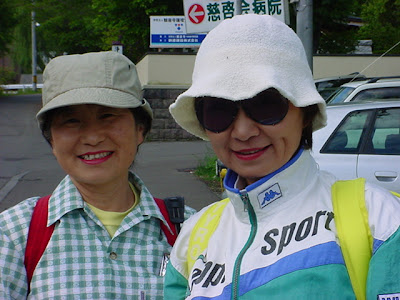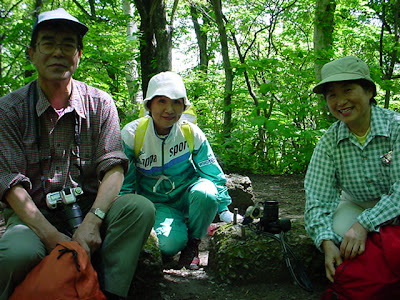An Undiscovered Treasure?
This letter is dedicated to my friend Mr. Kenji Miwa, a faithful Christian and Gideon in Saitama who prayed for me to come to Japan as a missionary...
* * * * *
Most of you have probably heard about the "greying of Japan," where the population of elderly Japanese is swelling far above the rest. People are having fewer babies these days, and the Japanese life span is increasing, so nursing homes, golf clubs and retirement facilities are full to overflowing with elderly Japanese.
Now put those statistics aside and witness a small miracle with me, right here on the windy streets of Sapporo...
My friend Barb, a missionary with another evangelical denomination, was getting ready to go back to America when she pulled me aside.
"You're like me," she said. "You're energetic, talk a lot, love to laugh. I think you'd be great with my best friends here in Sapporo. Only one of them is a Christian even though they've been studying English at our church."
So I went with Barb to meet the group - expecting college students, young people, made to match bouncy Barb - and instead I found a group of retired Japanese seniors, the youngest one being probably in his late 50s. Talk about a shock! As we sat around the table eating yakiniku (Japanese barbecued lamb and vegetables), I was even more shocked by their life and exuberance.
Yoshie is a mountain climber who climbed the Himalayas about two years ago.
Mr. Horimoto, probably in his 70s, made Japanese jokes and taught me how to punch the plastic bag around the napkin so it made a loud, "POW!" and startled the tables around us.
Keiko kept filling up my plate with meat and ordering Korean rice, all the while speaking perfect, beautiful English.
And Ken, the lone Christian, watched over everything like a wise old owl and printed up a special sheet with grammatically horrible Hokkaido slang ("for you to practice," he said with a laugh).
With Barb leaving, they wanted a new English teacher - so badly that they agreed to meet me on MY schedule, at MY apartment (all the way across town), and even study the Bible. Ken smiled. The women grumbled but agreed. "If that's the only way we can learn English," they said. "Only once a month. And only for 20 minutes." Mr. Horimoto just nodded and popped another plastic napkin bag.
So two Wednesdays ago I was scrambling to set up a space in the living room when the doorbell rang. In piled the four seniors, all laughing, all rowdy, with TWO OTHER WOMEN of the same age. They were toting coffee, a coffee maker, Ken's printed sheets about the "English club," and cameras.
I am not an English teacher by nature, not even an English Bible teacher, so with much prayer and trepidation I pulled out a stack of red Gideon Japanese-English New Testaments given by my dear friend Mr. Kenji (also in his 70s).
"This man gave me these Bibles to give to my friends," I told them, pulling Mr. Kenji's picture off my bulletin board.
That grabbed their interest in a heartbeat. They passed around Mr. Kenji's picture lovingly, speaking Japanese in low tones. "Wow," they were saying. "That was so nice of him."
Keiko asked in Japanese, "Is he a Christian?"
"Yes, he is," I replied, and told them Mr. Kenji's testimony. They were impressed, moved. They nodded and passed his picture around again. "Please tell him thank you for the Bibles," one of the women said, and everyone agreed.
When they picked up the Bibles this time, they handled them carefully.
Then it came, out of nowhere.
"So how did you become a Christian?" Keiko asked. All eyes fastened on me.
I told them my whole story - how I became a Christian, why I decided to come to Japan. Ken translated everything as they listened with rapt attention. "That's wonderful," they were saying in Japanese. I spoke for 15 minutes, and no one interrupted me. No one changed the subject.
When I picked up the Bible to explain to them what it was, they picked up theirs.
"This is the New Testament," I explained. "This is the story of Jesus' life and letters written by early church leaders."
Again - surprise. Light bulbs coming on in their heads. (Had no one ever explained to them the Bible before?)
I explained the difference between the Old and New Testaments, using a Japanese Bible for reference, and told them about the books in the New Testament.
"That's not hard!" one of them said in surprise as we paged through the Bible.
A huge mental wall just crumbled and fell. And I saw it. So many Japanese are afraid of the Bible, intimidated by the big words and formal Japanese. I hear an ancient Ethiopian whispering, "But how can I understand unless someone explains it to me?"
No Bible degree, no teacher's license - and here I am, witnessing a miracle just by being a Christian and telling what I know.
(Is it really that simple?)
I told them it was okay to write notes in the margins or underline parts, and every single one of them grabbed their pencils and made notes on the contents page: "Jesus' friends," one wrote by "Matthew, Mark, Luke and John."
"Let's try reading a couple of verses," I said, and showed them how to find books, chapters and verses.
We turned to 1 Corinthians 13 about love and began to read - first in English, then in Japanese.
Awed silence. People put on their glasses and looked closer, reading again silently, lips moving.
"Good words, good words!" they were saying in Japanese. "Wow! Amazing! I love this!"
"I love these words!" Keiko exclaimed to me in English.
Mr. Horimoto drew a big box around the verses in his Bible. And as we talked the next hour, he kept reading.
After discussing the Bible another half hour, I had to actually turn the conversation to the class so I would be remembered as keeping my word.
When the class ended, the women cleaned up the coffee maker and washed all the dishes (even the old ones I had left in the sink!) When I protested, they pushed me out of the kitchen. "We're housewives!" they said. "We're good at this!"
After eating hot bowls of ramen at a nearby restaurant, they dropped me back off at the apartment to meet again in two weeks. I spent the rest of the day in wonder... feeling like I had just stepped into something big. REALLY big.
This morning was the second class, and just like before, the doorbell sounded as I was putting coffee cups on the table.
Two of the members couldn't come today, but they'll be here next week, they assured me.
I prayed for another miracle as I spread Japanese zabuton pillows on the floor, everyone talking at the same time. Ken pulled out immaculate, alphabetized copies of new Hokkaido slang definitions for me. Keiko attacked the coffee maker. Everyone got out their red Gideon testaments.
(Wait a minute - didn't they only want to study the Bible once a month? And for 20 minutes only...?)
Then Keiko spotted our English children's Bible, with LARGE TYPE (why didn't I think of this before?) and we spent the REST OF THE CLASS PLUS 30 MINUTES OVERTIME reading from the children's Bible as Ken translated.
We practiced looking up verses in the Gideon testament - even had a race to see who could find 1 Thessalonians 5:16 first. Keiko won. She read it in English (twice) and in Japanese.
Yoshie washed all the dishes before I could protest, everyone gathered money for me to buy two new children's Bibles (one in English, one in Japanese) for class use only. Ken produced perfectly typed directions and a map for us to meet this Saturday (we're climbing Mount Moiwa!).
And when they left, as left time, I sat in the quiet of the room and marveled at the way God works.
I heard a soft whisper, "How can I understand unless someone explains it to me?"
Dear Ethiopian, I hear your words!
I pray that these precious seniors may let me come near to their chariots and lovingly turn the pages of their Bibles, showing them what it means to be a Christian, to be loved, comforted and convicted from these pages of God's word, to know the promise of abundant life, eternal life, and the One called "The LIFE."
Oh, how I pray I may bend my ear and hear the same words spoken to Philip from beautiful bronze lips: "Look, here is water! Why shouldn't I be baptized?"
The "greying of Japan" indeed... if these seniors, with their energy, time and resources could be changed by the Spirit of God, what a mission field is waiting for them in their own backyard.
Pray with me that the "grey" of Japan may turn to silver, "shining like stars as (they) hold out the Word of Life..." (Philippians 2:15).
And may we join the Ethiopian who went on his way "REJOICING"!
PRAY for the six members of the English club: Ken (a believer), Mr. Horimoto, Keiko, Yoshie, Etsuko and another lady with a really hard name.
PRAY for older believers like Mr. Kenji who have an unparalleled opportunity to witness to Japanese seniors.
PRAY for the elderly of Japan, that churches would be started among them and they would set a magnificent example for younger Japanese, children, and grandchildren - that entire generations may follow in their footsteps. Because the elderly are respected and revered in Japan, seniors (like Mr. Kenji) receive a special standing, and their testimonies carry a lot of weight. Pray for a special blessing on these seniors!

About the last photo...
Q: How many seniors can you fit in an apartment elevator?
A: Six, plus one young whipper-snapper. :)
Here are their names so you can (PLEASE!) pray: From left to right - Etsuko, Yoshie, Mr. Horimoto, Ken, and the lady with the hard name. Keiko was standing beside me, so she didn't show up. But she was there. Did I mention Keiko brought a coffee maker called "Carioca?" (I know, I know - all the Brazilians out there reading this are getting excited. If you want to know about "cariocas," ask a Brazilian. :)
And last but not least, here is Mr. Kenji's picture so you can pray for him...

















